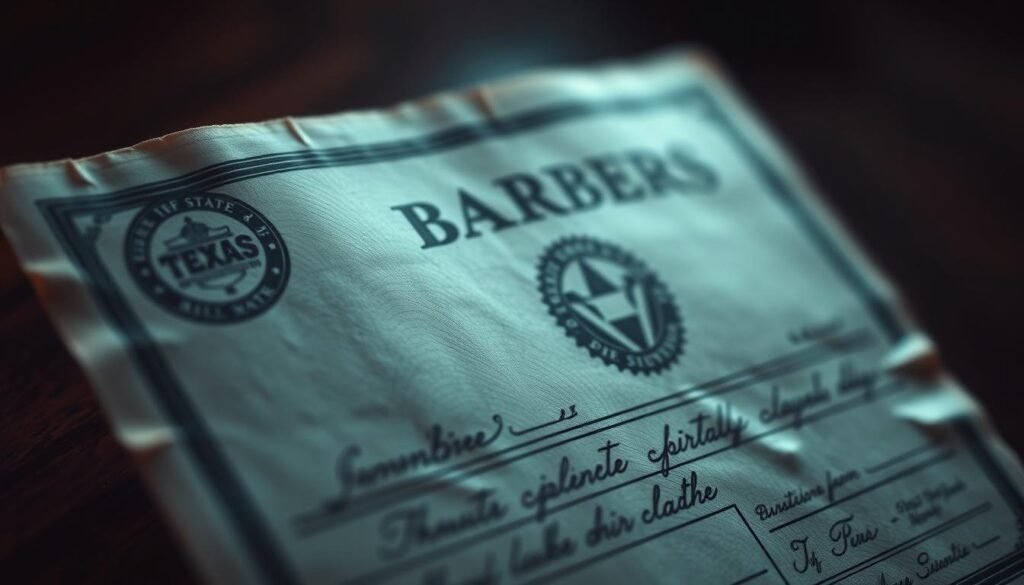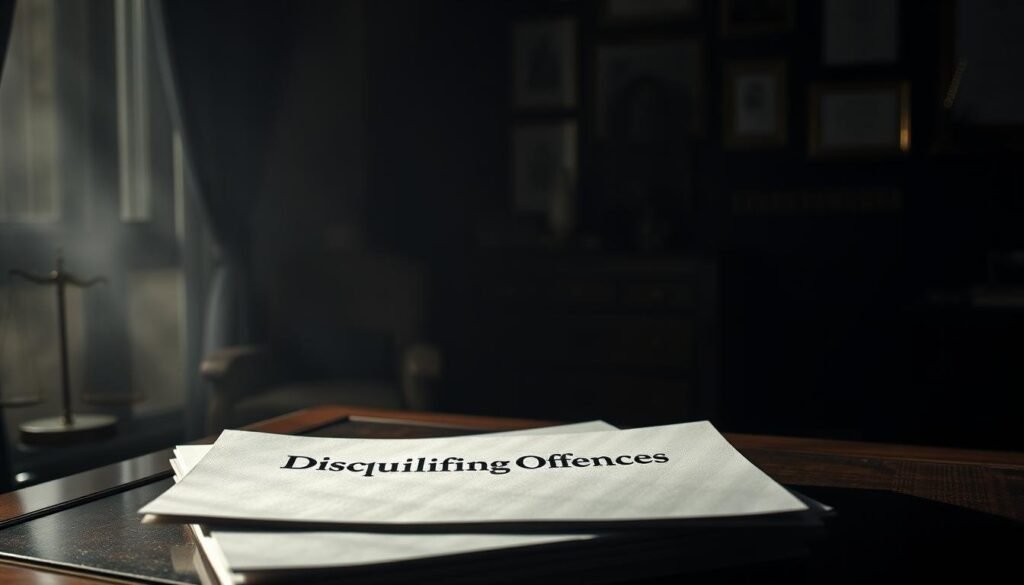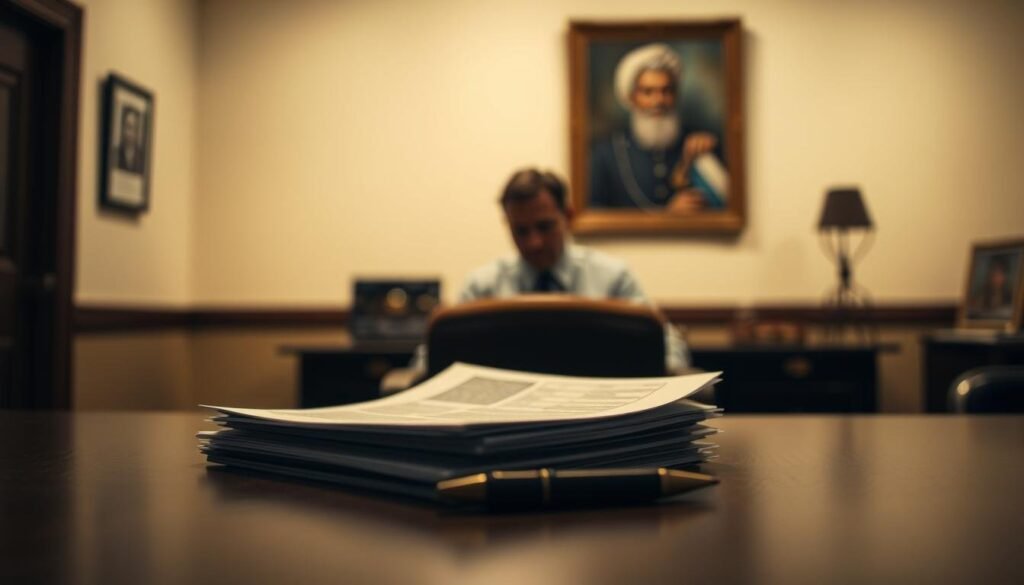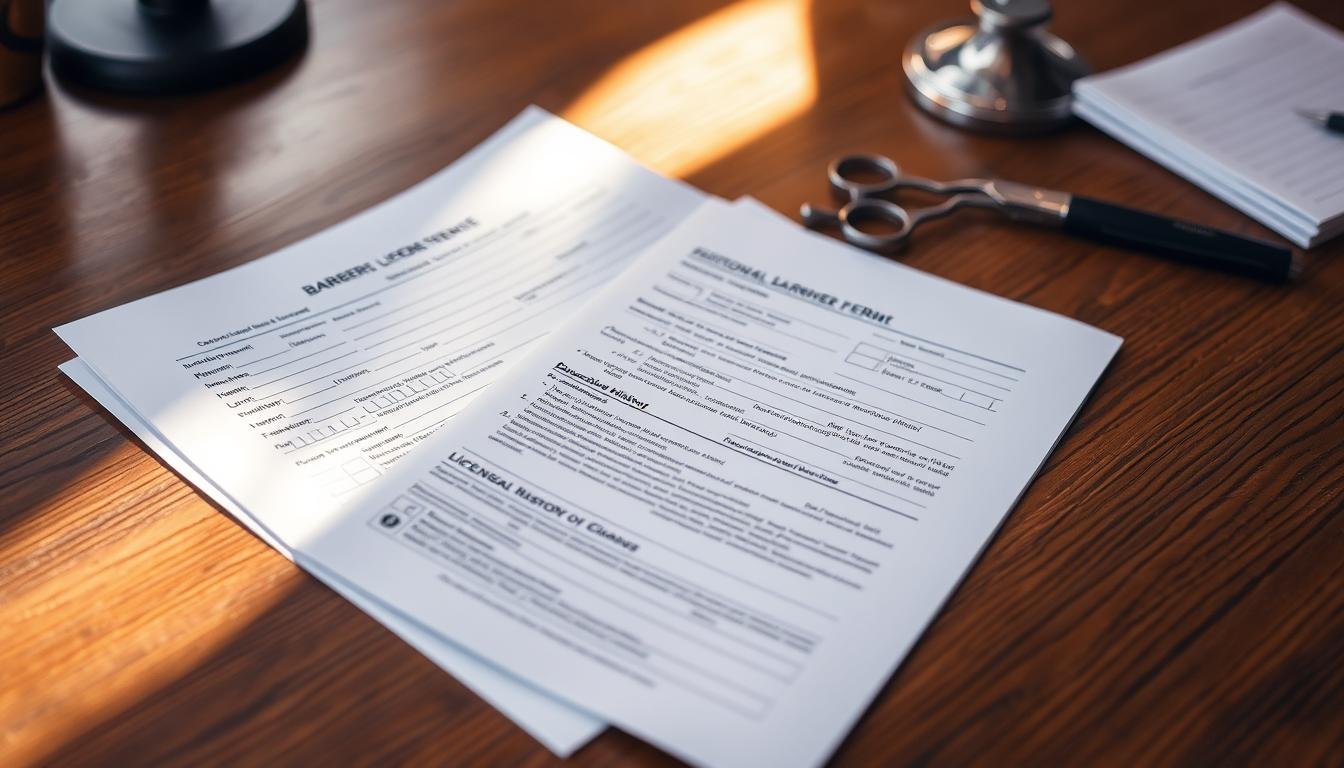Last updated on November 3rd, 2025 at 11:36 am
Can a Felon Become a Barber in Texas? Thinking about a new career and have a felony? You might wonder if you can still follow your dreams. Getting a barber license in Texas requires a process that can seem tough, especially with a criminal record.
It’s important to know the Texas barber requirements to see if you qualify. Texas has rules for getting a barber license, and some crimes might stop you. We’ll look into the chances and hurdles of becoming a licensed barber in Texas.
We’ll help you understand what affects your eligibility. We’ll also share tips to boost your chances of a successful application.
Contents
- 1 Understanding Texas Barber Licensing Requirements
- 2 Can a Felon Become a Barber in Texas?
- 3 How Criminal Background Checks Work for Barber Licenses
- 4 Disqualifying Offenses vs. Potential Exceptions
- 5 The Application Process for Barbers with Criminal Records
- 6 Preparing a Strong Application Despite a Criminal History
- 7 Alternative Pathways and Related Career Options
- 8 Options if Your Barber License Application is Denied
- 9 Conclusion: Can a Felon Become a Barber in Texas?
- 10 FAQ
- 10.1 Can I apply for a barber license in Texas if I have a felony conviction?
- 10.2 What kind of felony convictions might prevent me from getting a barber license in Texas?
- 10.3 How do I disclose my criminal history when applying for a barber license?
- 10.4 Can I appeal if my barber license application is denied due to my criminal history?
- 10.5 Are there any resources available to help me prepare my barber license application if I have a criminal record?
- 10.6 Will completing barber school or vocational training improve my chances of getting a barber license with a felony conviction?
- 10.7 Can I still work in the beauty industry if I’m unable to get a barber license?
- 10.8 How long after a felony conviction should I wait before applying for a barber license in Texas?
Understanding Texas Barber Licensing Requirements
If you want to be a barber in Texas, knowing the licensing rules is key. The Texas Department of Licensing and Regulation (TDLR) watches over the barber licensing process.
To get a barber license in Texas, you need to meet certain criteria. Here are the main steps and what you need to do:
- Finish the needed hours at a state-approved barber school.
- Pass the written and practical exams given by the TDLR.
- Apply for a license, paying the required fees.
- Go through a background check, as the TDLR requires.
The TDLR makes sure barber training programs are up to par. They ensure students learn about haircutting techniques, sanitation, and customer service.
- Finish your training at an approved barber school.
- Pass the licensing exams.
- Apply fully to the TDLR.
By following these steps, you can reach your dream of becoming a licensed barber in Texas.
Can a Felon Become a Barber in Texas?
If you’re a felon in Texas and want to become a barber, you might wonder if it’s possible. Texas has laws about barber licenses that look at your criminal history.
When you apply for a barber license in Texas, the Texas Department of Licensing and Regulation (TDLR) checks your background. They look at your criminal history to see if your felony affects your eligibility.

The TDLR looks at each application differently. They consider the type of felony, how long ago it happened, and if you’ve changed since then. Some felonies might stop you from getting a license, but others might not be as clear.
| Felony Type | Potential Impact on Licensing | Possible Actions |
|---|---|---|
| Violent crimes | High likelihood of denial | Consider alternative careers |
| Non-violent crimes | Case-by-case evaluation | Provide detailed documentation of rehabilitation |
| White-collar crimes | Variable, depends on severity | Highlight relevant skills and experience |
If you have a felony, getting a barber license is harder. You might need to give more information or explain your past. Having a felony doesn’t mean you can’t be a barber, but you should be ready for extra checks.
If you’re thinking about being a barber in Texas with a felony, talk to the TDLR or a lawyer. They can help you understand your chances and what you need to do.
How Criminal Background Checks Work for Barber Licenses
Applicants for a barber license must go through a detailed criminal background check. This is key to make sure people with certain crimes can’t get licenses. These licenses let them work with the public, doing personal grooming and client contact.
A criminal background check for a barber license looks at an applicant’s past crimes. It checks for past convictions, charges that are still pending, and arrests that didn’t lead to a conviction.
What Information is Considered in a Background Check
When checking a barber license application, several things are looked at:
- Felonies and misdemeanors
- Crimes involving moral turpitude
- Offenses related to drug or alcohol abuse
- Crimes against persons, including assault or battery
States might look at different things, but the main goal is to see if the applicant is safe for the public. They want to know if the applicant can be a professional and ethical barber. [Can a Felon Become a Barber in Texas?]
It’s important for people with a criminal history to know about background checks for barber licenses. This knowledge helps them get ready for the application. It also helps them deal with any issues from their past.
See Also: Can Felons Vote in California? Breaking Barriers!
Disqualifying Offenses vs. Potential Exceptions
When you’re on the path to becoming a licensed barber in Texas, it’s key to know which crimes might stop you. The Texas barber licensing authority does deep background checks. They do this to keep everyone safe and uphold professional standards.
Exceptions and Considerations for Applicants
Some crimes might keep you from getting a barber’s license. Others might be looked at more closely. Crimes involving moral turpitude, like fraud, usually mean you can’t get a license. But, the board might consider how long ago it happened and if you’ve changed since then.
The rules in Texas aim to keep everyone safe while giving people a second chance. If you have a criminal record, knowing how it might affect your application is important. [Can a Felon Become a Barber in Texas?]
Several things can affect if you get a license:
- The seriousness and type of crime
- How long it’s been since the crime happened
- Proof that you’ve changed, like through education or work

Getting a license is a big deal, and the Texas board tries to make fair choices. If you’re facing issues because of a criminal record, knowing the rules and possible exceptions can help. This way, you can make your application stronger.
Knowing about the crimes that might stop you and what the board looks at can help. It lets you show your skills and dedication to the job. This can help you get past initial problems and show you’re ready to be a licensed barber.
The Application Process for Barbers with Criminal Records
Getting a barber license with a criminal record needs careful planning. You must know the steps to make your application stand out. This ensures you meet Texas’s licensing rules. [Can a Felon Become a Barber in Texas?]
You’ll have to share your criminal history when applying. It’s important to be open and provide all the details. This includes court records, proof of completing sentences or programs, and references.
Being honest about your past is crucial for a good application.To begin, collect all needed documents. These are:
- Proof of identity
- Proof of residency
- Court documents related to your criminal history
- Records of vocational training or barber school completion

With all documents ready, start filling out the application. Make sure to answer every question honestly and fully. If you’re unsure, get help from a lawyer or a career counselor who knows about Texas barber licensing.
After you submit your application, the Texas barber licensing authority will review it. They’ll look at your qualifications and criminal history. They’ll decide if your past affects your ability to be a barber and if you’ve shown you’ve changed.
In summary, having a criminal record makes the application process harder. But, it’s not impossible. By preparing well, being truthful, and showing your dedication to your training, you can increase your chances of success.
Preparing a Strong Application Despite a Criminal History
To become a barber in Texas with a felony, you must address your criminal history. This involves several key steps. These steps can strengthen your application and show your commitment to the profession. [Can a Felon Become a Barber in Texas?]
First, completing barber school is crucial. It gives you the training and skills needed. It also shows the Texas Department of Licensing and Regulation (TDLR) that you’re serious about your career. Make sure to choose a program approved by the TDLR.
Getting vocational training beyond the minimum is also beneficial. This could include courses in business management, customer service, or specialized barbering techniques. Such training shows your dedication to excellence in your craft.
Showing your commitment to the profession is key. Gain as much practical experience as you can. This could be through internships or working under an experienced barber. Building a strong professional network in the industry is also helpful.
When applying for your barber license, make sure your application is complete. Include all required documents. Be open about your criminal history and provide any relevant documents or explanations. [Can a Felon Become a Barber in Texas?]
By focusing on these areas, you can improve your chances of getting a barber license in Texas despite a criminal history. It’s about presenting a strong, well-rounded application. This application should highlight your qualifications and commitment to the profession.
Alternative Pathways and Related Career Options
If becoming a licensed barber seems out of reach, you can still explore numerous alternative careers in the beauty industry. The industry is vast and offers various career paths beyond traditional barbering. This provides opportunities for individuals with different skills and interests.
One viable option is to pursue vocational training in specialized areas like makeup artistry, esthetics, or nail technology. These programs are often shorter than barbering courses. They can lead to certification or licensure in a specific area. For example, a makeup artist can work in film, television, or even start their own business offering services for special occasions.
- Skin care specialist
- Hair stylist or colorist
- Nail technician
- Spa manager or coordinator
- Beauty product sales representative
These roles offer a chance to work in a field you love. They also provide stability and potential for advancement. By exploring these alternative pathways, you can find a fulfilling career that aligns with your skills and interests, even if becoming a licensed barber is not feasible.
Ultimately, the beauty industry’s diversity means there’s likely a role that suits your strengths and passions. Whether through vocational training or by leveraging your existing skills, you can carve out a successful and rewarding career.
Options if Your Barber License Application is Denied
If your barber license application is denied, it’s important to know what to do next. The reasons for denial can vary, like issues with your background check or not meeting state requirements.
The first thing to do is read the denial letter carefully. It should explain why you were denied and how to appeal. The appeals process usually involves sending more documents or asking for a hearing.
Following the instructions in the denial letter is key. If you’re unsure, getting professional advice is a good idea. You might also want to consider these options:
- Requesting a hearing to appeal the licensing decision
- Submitting additional documentation to support your application
- Reapplying for the license after addressing the issues that led to the denial
| Option | Description | Potential Outcome |
|---|---|---|
| Request a Hearing | Appeal the licensing decision with additional evidence | License approval or further guidance |
| Submit Additional Documentation | Provide more information to support your application | Reconsideration of your application |
| Reapply | Address the issues that led to the denial and reapply | Potential approval upon reapplication |
Understanding the licensing decisions and the appeals process can help you navigate the system better. Knowing your options helps you make informed decisions about what to do next.
Conclusion: Can a Felon Become a Barber in Texas?
You now know how a felony can affect your path to becoming a barber in Texas. While it’s tough, it’s not impossible. The rules in Texas don’t always block people with felonies from getting a license. [Can a Felon Become a Barber in Texas?]
To succeed, you need to know which crimes might stop you and any exceptions. Make sure your application shows your hard work and dedication to the field. If you face a denial, you can appeal or look into other ways to get licensed.
With the right approach, you can still reach your career dreams, even with a felony. Keep up with Texas’s barber rules and get help from experts. This will help you get the best results for your application.
See Also: Can a Felon Become a Garbage Man?
FAQ
Can I apply for a barber license in Texas if I have a felony conviction?
Yes, you can apply. The Texas Department of Licensing and Regulation will look at your case. They consider the type of crime and other factors.
What kind of felony convictions might prevent me from getting a barber license in Texas?
Crimes like violent offenses or those against moral turpitude might bar you. But each case is judged on its own. [Can a Felon Become a Barber in Texas?]
How do I disclose my criminal history when applying for a barber license?
You must share all about your criminal past. This includes dates, charges, and outcomes in your application.
Can I appeal if my barber license application is denied due to my criminal history?
Yes, you can appeal. You’ll get details on how to do so with the denial notice. [Can a Felon Become a Barber in Texas?]
Are there any resources available to help me prepare my barber license application if I have a criminal record?
Yes, the Texas Department of Licensing and Regulation can help. Or, you can talk to a group that supports those with criminal records in beauty.
Will completing barber school or vocational training improve my chances of getting a barber license with a felony conviction?
Yes, it can help. Showing you’re serious about your career through education is good. It shows your commitment to being a licensed barber. [Can a Felon Become a Barber in Texas?]
Can I still work in the beauty industry if I’m unable to get a barber license?
Yes, there are other jobs in beauty you might qualify for. Even if you can’t be a licensed barber.
How long after a felony conviction should I wait before applying for a barber license in Texas?
There’s no set time to wait. But, a more recent conviction might affect your application more. It’s still up to the department to decide. [Can a Felon Become a Barber in Texas?]

Van Maldonado, born in California, holds a degree in Criminology and Police Science. Currently serving as an investigative officer at a local police station, he spends his leisure time writing insightful content for FelonScope.com.

